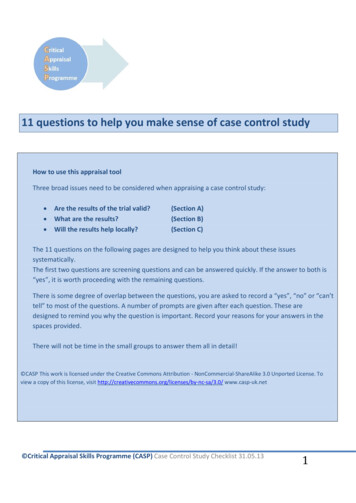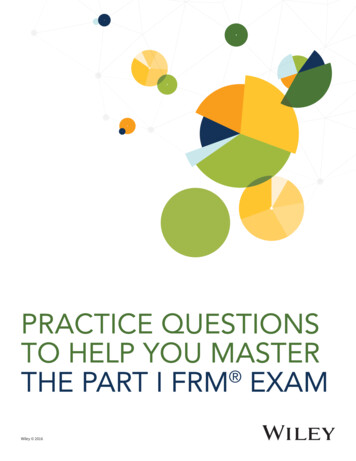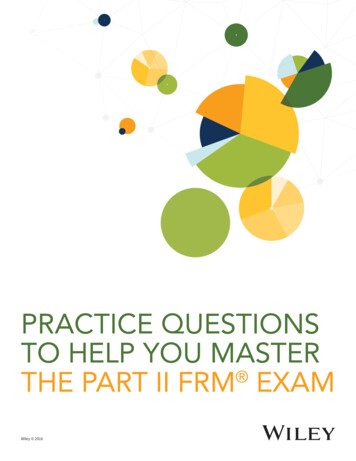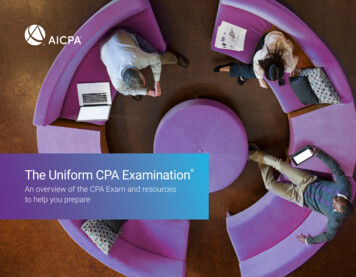
Transcription
11 questions to help you make sense of case control studyHow to use this appraisal toolThree broad issues need to be considered when appraising a case control study: Are the results of the trial valid?What are the results?Will the results help locally?(Section A)(Section B)(Section C)The 11 questions on the following pages are designed to help you think about these issuessystematically.The first two questions are screening questions and can be answered quickly. If the answer to both is“yes”, it is worth proceeding with the remaining questions.There is some degree of overlap between the questions, you are asked to record a “yes”, “no” or “can’ttell” to most of the questions. A number of prompts are given after each question. These aredesigned to remind you why the question is important. Record your reasons for your answers in thespaces provided.There will not be time in the small groups to answer them all in detail! CASP This work is licensed under the Creative Commons Attribution - NonCommercial-ShareAlike 3.0 Unported License. Toview a copy of this license, visit http://creativecommons.org/licenses/by-nc-sa/3.0/ www.casp-uk.net Critical Appraisal Skills Programme (CASP) Case Control Study Checklist 31.05.131
(A) Are the results of the study valid?Screening Questions1. Did the study address a clearly focused issue? Yes Can’t tell No Yes Can’t tell NoHINT: A question can be focused in terms of The population studied The risk factors studied Whether the study tried to detect a beneficialor harmful effect?2. Did the authors use an appropriate methodto answer their question?HINT: Consider Is a case control study an appropriate way ofAnswering the question under the circumstances?(Is the outcome rare or harmful) Did it address the study question?Is it worth continuing? Critical Appraisal Skills Programme (CASP) Case Control Study Checklist 31.05.132
Detailed questions3. Were the cases recruited in an acceptable Yes Can’t tell Noway?HINT: We are looking for selection bias which might compromisevalidity of the findings Are the cases defined precisely? Were the cases representative of a defined population?(geographically and/or temporally?) Was there an established reliable system for selectingall the cases Are they incident or prevalent? Is there something special about the cases? Is the time frame of the study relevant todisease/exposure? Was there a sufficient number of cases selected? Was there a power calculation?4. Were the controls selected in an Yes Can’t tell Noacceptable way?HINT: We are looking for selection bias which might compromiseThe generalisibilty of the findings Were the controls representative of defined population(geographically and/or temporally) Was there something special about the controls? Was the non-response high? Could non-respondentsbe different in any way? Are they matched, population based or randomlyselected? Was there a sufficient number of controls selected? Critical Appraisal Skills Programme (CASP) Case Control Study Checklist 31.05.133
5. Was the exposure accurately measured to Yes Can’t tell Nominimise bias?HINT: We are looking for measurement, recall or classification bias Was the exposure clearly defined and accuratelymeasured? Did the authors use subjective or objective measurements? Do the measures truly reflect what they are supposedto measure? (Have they been validated?) Were the measurement methods similar in the casesand controls? Did the study incorporate blinding where feasible? Is the temporal relation correct? (Does the exposureof interest precede the outcome?)6. (a) What confounding factors have theauthors accounted for?List:HINT: List the ones you think might be important, thatThe author missed. Genetic Environmental Socio-economic(b) Have the authors taken account Yes Can’t tell Noof the potential confounding factorsin the design and/or in their analysis?HINT: Look for Restriction in design, and techniques e.g. modellingstratified-, regression-, or sensitivity analysis tocorrect, control or adjust for confounding factors Critical Appraisal Skills Programme (CASP) Case Control Study Checklist 31.05.134
7. What are the results of this study?HINT: Consider What are the bottom line results? Is the analysis appropriate to the design? How strong is the association between exposureand outcome (look at the odds ratio)? Are the results adjusted for confounding, andmight confounding still explain the association? Has adjustment made a big difference to the OR?(B) What are the results?8. How precise are the results?How precise is the estimate of risk?HINT: Consider Size of the P-value Size of the confidence intervals Have the authors considered all the importantvariables? How was the effect of subjects refusing toparticipate evaluated?9. Do you believe the results? Yes NoHINT: Consider Big effect is hard to ignore!Can it be due to chance, bias or confounding?Are the design and methods of this study sufficientlyflawed to make the results unreliable?Consider Bradford Hills criteria (e.g. time sequence,dose-response gradient, strength, biologicalplausibility) Critical Appraisal Skills Programme (CASP) Case Control Study Checklist 31.05.135
(C) Will the results help locally?10. Can the results be applied to the local Yes Can’t tell No Yes Can’t tell Nopopulation?HINT: Consider whether The subjects covered in the study could besufficiently different from your populationto cause concernYour local setting is likely to differ muchfrom that of the studyCan you quantify the local benefits and harms?11. Do the results of this study fit withother available evidence?HINT: Consider all the available evidence from RCT’s,systematic reviews, cohort studies and case-controlstudies as well for consistency.RememberOne observational study rarely provides sufficiently robust evidence to recommend changes to clinical practice or within healthpolicy decision making.However, for certain questions observational studies provide the only evidence.Recommendations from observational studies are always stronger when supported by other evidence. Critical Appraisal Skills Programme (CASP) Case Control Study Checklist 31.05.136
Three broad issues need to be considered when appraising a case control study: Are the results of the trial valid? (Section A) What are the results? (Section B) Will the results help locally? (Section C) The 11 questions on the following pages are designed to help you think about these issues systematically.











